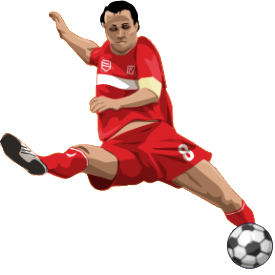Basic Types of Verbs: Action Verbs
There are three basic types of verbs in the English language, namely the action verb, the linking verb, and the auxiliary verb. In this article, the most common type will be discussed—the action verb.
Definition of Action Verbs
Action verbs can be simply defined as the type of verbs used to express actions instead of states of being. Unlike verbs which describe a particular state, action verbs can be expressed in the progressive tense.
*Note: Progressive tenses of verbs are used to show that an action is in progress. (e.g., playing; writing; dancing; pointing; fighting)
Explanation of Action Verbs
As stated in the definition above, action verbs are used to describe an action or a behavior. They do not only describe physical actions (e.g., walk; punch; run) which can be done by a person, an animal, or a thing, but also those which are classified as mental actions such as: think, ponder, imagine, and wonder.
Another thing that you should know about action verbs is that they can be expressed in different tenses such as the past tense, present tense, progressive tense, and future tense, to show the time when an action occurred or when it was done.
Examples of Action Verbs
Kick
Fly
Shout
The underlined words in the following sentences are some examples of action verbs:
- Joseph drove his Mustang down 10th Street.
- His dirty clothes and shoes covered the entire bedroom floor.
- The dark clouds washed over the sky.
- Denise reached for the huge bowl of beef and wonton noodles.
- My little sister cried when Little Foot died.
- The earthquake destroyed our ancestral house.
- Richard watched the skaters do awesome tricks.
- The baby giggled as her dad made crazy faces.
- Alexis designed our new company shirt.
- I interviewed 18 applicants today.
- Mark carried the two sacks of rice at the same time.
- The lightning struck the tree.
Examples of Action Verbs in Literature
All of the underlined words below are some examples of action verbs from famous literary pieces.
- “In December, the wind wraps itself around bare trees and twists in between husbands and wives asleep in their beds.” – Alice Hoffman, Here on Earth
- “The late afternoon sun hung low in the sky as Harry and Hagrid made their way back down Diagon Alley, back through the wall, back through the Leaky Cauldron, now empty.” –J.K Rowling, Harry Potter and the Sorcerer’s Stone
- “Canoes glided across a small lake.” – Rick Riordan, The Lightning Thief
- “Mist snaked across the scorched area and swirled unsubstantial tendrils over the stone.” – Christopher Paolini, Eragon
- “The sky arched over them, higher than they could have imagined, a pale, clear blue.” – Jeanne DuPrau, City of Ember
- “The Capitol twinkles like a vast field of fireflies.” – Suzanne Collins, The Hunger Games
- “Bertholt took it and scrawled his signature across the line.” –Eoin Colfer, Artemis Fowl: The Opal Deception
- “The orcs yelled and poured over the stone gangways.” – J.R.R Tolkien, The Fellowship of the Ring
- “The nest bursts open like an egg, and a furious swarm of tracker jackers takes to the air.” – Suzanne Collins, The Hunger Games
- “We bumped along with the sprayer behind us, all the way to Lake Windsor Downs.” – Edward Bloor, Tangerine
- “It shakes the shingles from the roofs and sifts rough cracks in the plaster.” – Alice Hoffman, Here on Earth
- “They found the stone steps without difficulty, and Gimli sprang swiftly up them, followed by Gandalf and Frodo.” – J.R.R Tolkien, The Fellowship of the Ring
Function of Action Verbs
Basically, the major function of this type of verb is to convey an action (physical or mental) or a specific behavior. If you find it hard to spot the action verb in a sentence, you can just look at each word in the text and ask yourself: “Can a person, animal, or thing do/perform this?”
Sample Sentence:
Pauline marched across the empty hall.
Can you Pauline? No. Can you march? Can you across? No. Can you the? No. Can you empty? No. Can you hall? No.
Therefore, it can be said that there is only one action verb in the sample sentence above: marched.
Always remember that action verbs are not only limited to actions that people do, but also to those things which an animal, a thing, or a force of nature can do.


